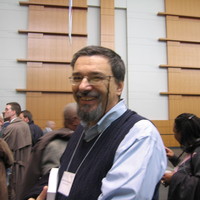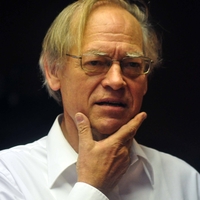Books by Todd Billings
"Celebrating the Lord's Supper," says award-winning author and theologian J. Todd Billings, "can ... more "Celebrating the Lord's Supper," says award-winning author and theologian J. Todd Billings, "can change lives."
In this book Billings shows how a renewed theology and practice of the Lord's Supper can lead Christians to rediscover the full richness and depth of the gospel. With an eye for helping congregations move beyond common reductions of the gospel, he develops a vibrant, biblical, and distinctly Reformed sacramental theol-ogy and explores how it might apply within a variety of church contexts, from Baptist to Presbyterian, nondenominational to Anglican.
At once strikingly new and deeply traditional, Remembrance, Communion, and Hope will surprise and challenge readers, inspiring them to a new understanding of--and appreciation for--the embodied, Christ-disclosing drama of the Lord's Supper.
At the age of thirty-nine, Christian theologian Todd Billings was diagnosed with a rare form of i... more At the age of thirty-nine, Christian theologian Todd Billings was diagnosed with a rare form of incurable cancer. In the wake of that diagnosis, he began grappling with the hard theological questions we face in the midst of crisis: Why me? Why now? Where is God in all of this? This eloquently written book shares Billings's journey, struggle, and reflections on providence, lament, and life in Christ in light of his illness, moving beyond pat answers toward hope in God's promises. Theologically robust yet eminently practical, it engages the open questions, areas of mystery, and times of disorientation in the Christian life. Billings offers concrete examples through autobiography, cultural commentary, and stories from others, showing how our human stories of joy and grief can be incorporated into the larger biblical story of God's saving work in Christ.
Westminster John Knox Press, Oct 1, 2012
J. Todd Billings and I. John Hesselink have compiled an essential collection of essays for the st... more J. Todd Billings and I. John Hesselink have compiled an essential collection of essays for the study of John Calvin's theology. Leading Calvin scholars examine the early and late reception-history of Calvin's fundamental teachings, including reflections on the contemporary possibilities and limitations in developing Calvin's thought.
Contributors include Timothy Hessel-Robinson, Michael S. Horton, Mark Husbands, David Little, Suzanne McDonald, Jeannine E. Olson, Sue A. Rozeboom, and Carl R. Trueman.
In this book, J. Todd Billings recovers the biblical theme of union with Christ for today's churc... more In this book, J. Todd Billings recovers the biblical theme of union with Christ for today's church, making a fresh contribution to the theological discussion with important applications for theology and ministry. Drawing on Scripture and the thought of figures such as Augustine, Calvin, Bavinck, and Barth, Billings shows how a theology of union with Christ can change the way believers approach worship, justice, mission, and the Christian life. He illuminates how union with Christ can change the theological conversation about thorny topics such as total depravity and the mystery of God. Billings also provides a critique and alternative to the widely accepted paradigm of incarnational ministry and explores a gospel-centered approach to social justice. Throughout, he offers a unique and lively exploration of what is so amazing about being united to the living Christ.
Eerdmans Press, Jan 1, 2010
This book fills a real need for pastors and students. Though there is currently a large body of m... more This book fills a real need for pastors and students. Though there is currently a large body of material on the theological interpretation of Scripture, most of it is highly specific and extremely technical. J. Todd Billings here provides a straightforward entryway for students and pastors to understand why theological interpretation matters and how it can be done.
A solid, constructive theological work, The Word of God for the People of God presents a distinctive Trinitarian, participatory approach toward reading Scripture as the church. Billings's accessible yet substantial argument for a theological hermeneutic is rooted in a historic vision of the practice of scriptural interpretation even as it engages a wide range of contemporary issues and includes several exegetical examples that apply to concrete Christian ministry situations.

Oxford University Press, Jan 1, 2007
Is the God of Calvin a fountain of blessing, or a forceful tyrant? Is Calvin's view of God coerci... more Is the God of Calvin a fountain of blessing, or a forceful tyrant? Is Calvin's view of God coercive, leaving no place for the human qua human in redemption? These are perennial questions about Calvin's theology which have been given new life by Gift theologians such as John Milbank, Graham Ward, and Stephen Webb.
J. Todd Billings addresses these questions by exploring Calvin's theology of "participation in Christ." He argues that Calvin's theology of "participation" gives a positive place to the human, such that grace fulfills rather than destroys nature, affirming a differentiated union of God and humanity in creation and redemption. Calvin's trinitarian theology extends to his view of prayer, sacraments, the law, and the ecclesial and civil orders. In light of Calvin's doctrine of participation, Billings reframes the critiques of Calvin in the Gift discussion and opens up new possibilities for contemporary theology, ecumenical theology, and Calvin scholarship as well.
Book Reviews by Todd Billings
Christian Scholars Review, 2002
Reviews naturalistic humanism does not offer any real basis for the belief that human evils will ... more Reviews naturalistic humanism does not offer any real basis for the belief that human evils will dimin-747 ish in the foreseeable future; neither does it provide a coherent incentive for people.to work for such an outcome. But the Christian story, by contrast, does offer a basis for a positive attitude toward the future. Christians can live in the attitude of hope and prayer that God has called them to, knowing that their efforts to grow as persons and make the world a better place are in tune with the Creator's will. This "premodern" way, Graham argues, is ultimately more helpful than the various "modern" alternatives.
A Time to Keep is an odyssey—a journey through childhood and adolescence, work and sexuality, agi... more A Time to Keep is an odyssey—a journey through childhood and adolescence, work and sexuality, aging and dying. The reader encounters Sigmund Freud on dying and death, Jennifer Michael Hecht on the history of suicide, Martin Luther on the nature of work, and the Book of Leviticus on the body and holiness. He will cross the battlefields of same-sex marriage, euthanasia, and transhumanist visions of the person. What ties all these together is the body—understood in terms of the Christian story and the limits of our mortal frame. . . .











Uploads
Books by Todd Billings
In this book Billings shows how a renewed theology and practice of the Lord's Supper can lead Christians to rediscover the full richness and depth of the gospel. With an eye for helping congregations move beyond common reductions of the gospel, he develops a vibrant, biblical, and distinctly Reformed sacramental theol-ogy and explores how it might apply within a variety of church contexts, from Baptist to Presbyterian, nondenominational to Anglican.
At once strikingly new and deeply traditional, Remembrance, Communion, and Hope will surprise and challenge readers, inspiring them to a new understanding of--and appreciation for--the embodied, Christ-disclosing drama of the Lord's Supper.
Contributors include Timothy Hessel-Robinson, Michael S. Horton, Mark Husbands, David Little, Suzanne McDonald, Jeannine E. Olson, Sue A. Rozeboom, and Carl R. Trueman.
A solid, constructive theological work, The Word of God for the People of God presents a distinctive Trinitarian, participatory approach toward reading Scripture as the church. Billings's accessible yet substantial argument for a theological hermeneutic is rooted in a historic vision of the practice of scriptural interpretation even as it engages a wide range of contemporary issues and includes several exegetical examples that apply to concrete Christian ministry situations.
J. Todd Billings addresses these questions by exploring Calvin's theology of "participation in Christ." He argues that Calvin's theology of "participation" gives a positive place to the human, such that grace fulfills rather than destroys nature, affirming a differentiated union of God and humanity in creation and redemption. Calvin's trinitarian theology extends to his view of prayer, sacraments, the law, and the ecclesial and civil orders. In light of Calvin's doctrine of participation, Billings reframes the critiques of Calvin in the Gift discussion and opens up new possibilities for contemporary theology, ecumenical theology, and Calvin scholarship as well.
Book Reviews by Todd Billings
In this book Billings shows how a renewed theology and practice of the Lord's Supper can lead Christians to rediscover the full richness and depth of the gospel. With an eye for helping congregations move beyond common reductions of the gospel, he develops a vibrant, biblical, and distinctly Reformed sacramental theol-ogy and explores how it might apply within a variety of church contexts, from Baptist to Presbyterian, nondenominational to Anglican.
At once strikingly new and deeply traditional, Remembrance, Communion, and Hope will surprise and challenge readers, inspiring them to a new understanding of--and appreciation for--the embodied, Christ-disclosing drama of the Lord's Supper.
Contributors include Timothy Hessel-Robinson, Michael S. Horton, Mark Husbands, David Little, Suzanne McDonald, Jeannine E. Olson, Sue A. Rozeboom, and Carl R. Trueman.
A solid, constructive theological work, The Word of God for the People of God presents a distinctive Trinitarian, participatory approach toward reading Scripture as the church. Billings's accessible yet substantial argument for a theological hermeneutic is rooted in a historic vision of the practice of scriptural interpretation even as it engages a wide range of contemporary issues and includes several exegetical examples that apply to concrete Christian ministry situations.
J. Todd Billings addresses these questions by exploring Calvin's theology of "participation in Christ." He argues that Calvin's theology of "participation" gives a positive place to the human, such that grace fulfills rather than destroys nature, affirming a differentiated union of God and humanity in creation and redemption. Calvin's trinitarian theology extends to his view of prayer, sacraments, the law, and the ecclesial and civil orders. In light of Calvin's doctrine of participation, Billings reframes the critiques of Calvin in the Gift discussion and opens up new possibilities for contemporary theology, ecumenical theology, and Calvin scholarship as well.
God's choice to take on the humble, loving, humanity of Christ means that all who are "in
Christ" come to participate in his full humanity, which showed an astonishing amount of freedom. Christ was free of the domination of self-interest, which has comfort and the avoidance of suffering as a supreme goal. He was also free of a mentality associated with the missionary compound, which can thrive on distance from those in need, with a condescending attitude toward outsider
“The Catholic Calvin,” Pro Ecclesia 20:2 (Spring 2011): 120-134.
Rooted in the eternal love of the Triune God, the Father sends the Word to create fellowship by the Spirit with a people whom he has appointed to be a sign of his sovereign love for the whole creation. God gives the Word to his people through preaching, baptism, and the Lord’s Supper, which are instruments of grace received by the Spirit through faith. The sacraments are material signs and seals of God’s covenant promise, through which the Risen Christ communicates his person and benefits by the power of the Spirit. Baptism is the sacrament of incorporation into Christ and his body, the church; the Lord’s Supper is the sacrament of communion with Christ and his people, providing nourishment for grateful service to God and neighbor. Through preaching and the sacraments, the Spirit unites a community of witnesses to Jesus Christ and his kingly love for the world.